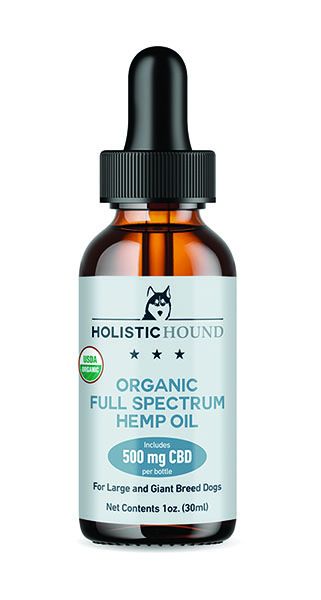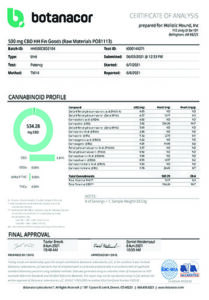
Supplements for pets that contain cannabidiol (CBD) – a derivative of the Cannabis plant that contains no psychoactive compounds – have exploded in popularity.
According to the Packaged Facts survey “Pet Supplements in the U.S.,” 21 percent of dog owners purchased CBD supplements in 2020. Packaged Facts estimated the sales of CBD pet products in 2020 at $95 million, a 217% increase from the year prior. And Pet Product News recently reported that the nation’s largest pet supply store chains have all formed retail relationships with CBD supplement manufacturers. Petco sells CBD products from Pet Releaf, PetSmart stores (in some areas only) sell CBD products from Mary’s Tails, and Pet Supplies Plus carry Medterra and Kradle. Even Martha Stewart is hawking a line of CBD products for pets (made by Canopy Animal Health, a subsidiary of Canopy Growth).
So, clearly, you have a lot of CBD pet product to pick from. How do you choose?
- First, read the label or product description carefully to make sure the product contains CBD. There are hundreds of products on the market (many of which you can find with an online search for “CBD pet supplements) that do not contain CBD. Sure, the label may hype the “hemp” in the product, but unless it specifically says it contains CBD, it doesn’t. Hint: Neither Chewy.com nor Amazon.com sell pet supplements that contain CBD – lots of hemp-containing products, but no CBD.

There may be health benefits from hemp-sourced products that do not contain CBD, but if you’re looking for the specific benefits of CBD for your dog, you need to buy a CBD-containing product!
- Now look for a report from an independent laboratory that tested the product. Don’t buy products if they have not been tested by a third-party lab, or if the results are not dated and code-matched to the batch of product you are considering.
Reputable manufacturers post their products’ lab reports on their websites or have QR codes that take you to online reports – but check the dates! The report should include the date, clearly identify the product that was tested, and state the name, address, and phone number of the test provider.
- Check the lab reports for microbial contaminants, heavy metals, pesticides, and potency. Hemp plants are susceptible to fungal growth, which can lead to the presence of carcinogenic mycotoxins, and readily absorb heavy metals from their environment. Inadvertent adulteration with heavy metals is also possible during manufacturing. And pesticide use is common in the farming of hemp. So the third-party lab reports should indicate that the products contain no microbial contaminants, heavy metals, or pesticides.
- Check the independent lab results to confirm the type and amount of CBD in the product. There are an estimated 80 to 100 cannabinoid substances (chemicals that are capable of binding with the cannabinoid receptors in our bodies and our dogs’ bodies) in hemp plants; the presence and amount of these substances vary according with the variety of the hemp plant. CBD product makers strive to use plant strains that produce none of the psychoactive tetrahydrocannabinol (THC) cannabinoids; supplements that contain more than 0.3% THC cannot be legally sold.
The lab report should specify which cannabinoids are present in the product and in what amount, so you can administer consistent dosages for a predictable effect.
- Don’t buy products that make claims to prevent, cure, or manage disease. Any substance that makes therapeutic claims must be approved by the FDA. This process does not apply to products that are considered to be supplements, which is how CBD products are currently treated. By virtue of the Dietary Supplement Health and Education Act of 1994 (DSHEA), supplements may not be labeled or marketed for the prevention, diagnosis, treatment, mitigation, or cure of disease.
If a product label or company literature makes the product sound like a cure for anything that ails your dog, avoid that company’s products. Similarly, avoid products labeled as “treats,” which are regulated as food and cannot legally contain CBD. An example would be “CBD dog treats for anxiety.” Violations of labeling laws indicate either an inexperienced or unscrupulous product manufacturer. Either way, avoid that company.
- Look for clear indications for use, dosage information, and instructions.
- If you can, ask a company representative what makes their products better than their competitors’. Listen for exaggerated claims – and ask for substantiation! The best companies should be at least participating in research studies of their products, if they don’t already have study results to tell you about.
- Look for products from companies who have been at this for more than a few years. Many CBD-product manufacturers are here today and gone tomorrow. Longevity alone doesn’t prove the efficacy of a product; some companies were launched with massive investments from venture capital companies, helping some start-ups survive even with ineffective products. But time in the industry lends experience and credence to a company’s mission.
- Look for a seal of approval from the National Animal Supplement Council (NASC), which identifies products from companies that are committed to quality and continuous improvement. To earn an NASC Quality Seal, the supplement maker must, among other things, have a quality control manual in place, which helps ensure the company is providing a consistent and quality product; have an adverse event reporting/complaint system in place to monitor and evaluate products in real time; and pass an independent third-party audit every two years.
In 2021, the U.S. Food & Drug Administration (FDA) published the results of a study that analyzed products that contained hemp or cannabidiol substances. Almost 150 products were subjected to tests to determine which cannabinoids were present in the products. Fewer than half of products surveyed contained cannabidiol concentrations within 20% of their label declarations.
Third-party lab testing and certification from the NASC are meant to prevent such results.
- We recommend buying CBD pet supplements from independent pet supply stores with have staff members who are familiar with the products – who have used them on their own pets. If this is not possible for you (if you live in an area where no such store exists), contact the makers of the products you are considering for support.
First-time users will benefit from guidance regarding dosage and what type of product will work best for their dogs – and since veterinarians are prohibited in most states from even discussing CBD with their clients, much less recommending a particular product, the next-best guide is an experienced user of the products with a close, long-term retail relationship with conscientious product suppliers.
The growing number of CBD’s dog-owner fans believe that CBD relieves pain, anxiety, seizure activity, and allergies, and combats immune-mediated syndromes and cancer. But makers of CBD supplements, which are regulated under the Dietary Supplement Health and Education Act of 1994 (DSHEA), may not legally say that CBD treats or cures any disease or any medical symptom; those are “drug” claims, which fall under the purview of the FDA.
Until recently, CBD’s popularity has been driven largely by anecdotal evidence, because there were significant legal impediments for both academic and commercial research into CBD, as well as barriers for growing and harvesting these plants, then refining and selling products that contain CBD. Passage of the Agriculture Improvement Act (better known as the Farm Bill) in 2018 descheduled Cannabis species with less than 0.3% dry weight of the Delta-9 tetrahydrocannabinol (THC), which removed these barriers and opened the floodgates of both research into CBD’s safety and benefits and commercial production of CBD-containing products.
So far, studies have been promising. A 2018 study by Cornell University researchers on dogs with osteoarthritis showed no observable side effects, a significant decrease in the dogs’ pain, and an increase in activity. A small Colorado State University study (16 dogs) investigated the use of CBD to treat idiopathic seizures in dogs and found an 89% reduction in seizure frequency in dogs receiving CBD.
It’s hard to imagine that the CBD for dogs industry could have grown so quickly without ample anecdotal evidence that at least some of the products are helping dogs. Scoundrels abound in any new, fast-growing industry, but few people are repeat buyers of things that don’t work. The spectacular growth of the industry suggests they do work – and the stunning lack of adverse experience reports should encourage you to give CBD a try for your dog.
Thanks to Annabell Bivens of The Dog Store in Alexandria, Virginia, for her help with this article. Nancy Kerns is the editor of WDJ.





